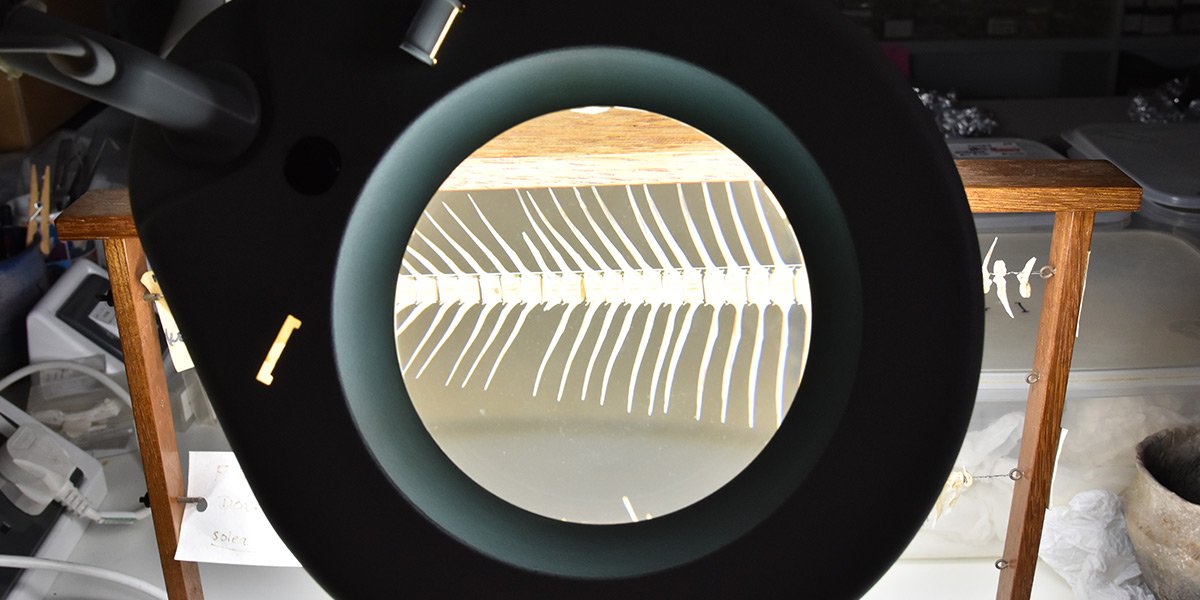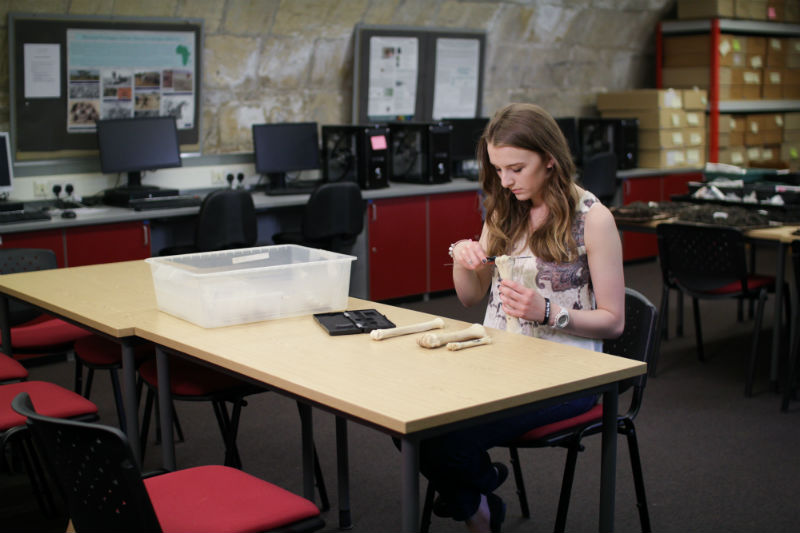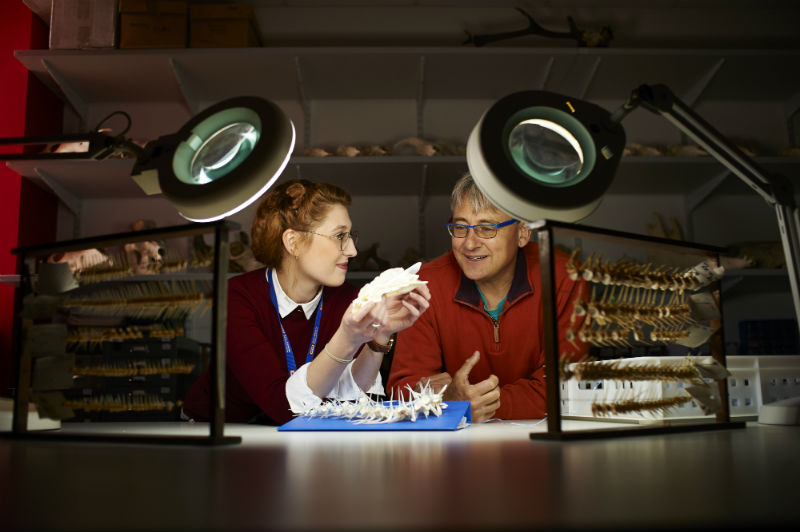
Study animals from the past with the techniques of the future
Year of entry: 2025 (September)
1 year full-time,
2 years part-time,
3 years part-time
September 2025 (semester dates)
Join us online or in person to find out more about postgraduate study at York.
Find out moreQS World University Rankings by Subject, 2025
QS World University Rankings by Subject, 2025
Join the UK's only dedicated course in the archaeological study of animals.
Any consideration of the human past is incomplete without examining the essential roles that animals have played in our economies and societies. On this course you will study archaeological animal remains on a macro and micro scale to investigate what they tell us about how humans and other species have co-existed over the millennia.
The scope of the course is global, equipping you with the knowledge and techniques to study the roles of animals in human societies from the Palaeolithic to the present and around the world. You will have the opportunity to select modules taught by leading academics in both traditional and biomolecular zooarchaeology, and options led by dedicated specialists in evolutionary anatomy, enabling you to master the latest analytical techniques and examine skeletal anatomy.
York is the UK's archaeological capital and we use it extensively as our ‘living lab’ for both teaching and research.
Informality is one of our distinctive qualities - the atmosphere in our department is friendly, supportive and enthusiastic. We want you to develop your potential and thrive at York.
You will study 180 credits over the duration of your course:
You will choose three option modules from examples including:
You'll also have the opportunity to choose options from our full module catalogue:
Our modules may change to reflect the latest academic thinking and expertise of our staff, and in line with Department/School academic planning.
Every course at York is built on a distinctive set of learning outcomes. These will give you a clear understanding of what you will be able to accomplish at the end of the course and help you explain what you can offer employers. Our academics identify the knowledge, skills, and experiences you'll need upon graduation and then design the course to get you there.
 The modules offered are diverse and cover all aspects zooarchaeological practice and techniques. Option modules allow freedom to study topics of interest such as field archaeology and artefacts. I learned many new skills while developing existing ones.Ewan, MSc Zooarchaeology
The modules offered are diverse and cover all aspects zooarchaeological practice and techniques. Option modules allow freedom to study topics of interest such as field archaeology and artefacts. I learned many new skills while developing existing ones.Ewan, MSc Zooarchaeology
| Study mode | UK (home) | International and EU |
|---|---|---|
| Full-time (1 year) | £11,200 | £25,900 |
| Part-time (2 years) This is the year 1 fee. Fees for future years are subject to confirmation. |
£5,600 | £12,950 |
| Part-time (3 years) This is the year 1 fee. Fees for future years are subject to confirmation. |
£3,733 | £8,633 |
Students on a Student Visa are not currently permitted to study part-time at York.
For courses which are longer than one year, the tuition fees quoted are for the first year of study.
UK (home) or international fees? The level of fee that you will be asked to pay depends on whether you're classed as a UK (home) or international student. Check your fee status.
Find out more information about tuition fees and how to pay them.
We don't anticipate there being any additional fees associated with this course. All books and resources you need will be available in the library or online and it isn't mandatory that you buy your own copies. You may wish to set aside a small budget for photocopying, depending on how you like to work.
Discover your funding options to help with tuition fees and living costs.
We'll confirm more funding opportunities for students joining us in 2025/26 throughout the year.
If you've successfully completed an undergraduate degree at York you could be eligible for a 10% Masters fee discount.
We are pleased to work with Chevening Scholars to offer funding for our Masters programmes. Chevening Scholarships provide one year of fully-funded postgraduate study in the UK for international (including EU) students. The scholarships are open to early and mid-career professionals who have the potential to become future leaders.
We have a variety of funding options available within the department.
You can use our living costs guide to help plan your budget. It covers additional costs that are not included in your tuition fee such as expenses for accommodation and study materials.
You’ll work with world‐leading academics who’ll challenge you to think independently and excel in all that you do. Our approach to teaching will provide you with the knowledge, opportunities, and support you need to grow and succeed in a global workplace.
You will be taught through a combination of lectures, workshops and seminars, with an emphasis on student led-discussion. You will have hands-on practical classes.
You'll have access to specialist laboratories for ancient DNA analysis, proteomics, microscopy and isotope geoscience, and to the expertise of evolutionary anatomists from the Hull York Medical School, with their suite of 3D scanning, modelling and Geometric Morphometrics (GMM) capabilities.
You will be based on Campus West and in King's Manor. Practical classes will take place in the PalaeoHub, a facility that brings Archaeology together with the functional and comparative anatomists from the Centre for Anatomical and Human Sciences, part of the Hull York Medical School.
Our beautiful green campus offers a student-friendly setting in which to live and study, within easy reach of the action in the city centre. It's easy to get around campus - everything is within walking or pedalling distance, or you can always use the fast and frequent bus service.
You will be assessed by a variety of methods. Depending on which modules you opt to take, these could include:


Many of our Zooarchaeology students go on to conduct further research at PhD level. Others progress into careers with archaeological units, museum services, conservation bodies and a range of other organisations.
 Completing York’s Zooarchaeology programme has not only allowed me to become an effective researcher who is well versed in current zooarchaeological and bioarchaeological methodologies, but also an asset in the field where my zooarchaeological expertise is a valuable commodity.Erin, MSc Zooarchaeology
Completing York’s Zooarchaeology programme has not only allowed me to become an effective researcher who is well versed in current zooarchaeological and bioarchaeological methodologies, but also an asset in the field where my zooarchaeological expertise is a valuable commodity.Erin, MSc Zooarchaeology
| Typical offer | |
|---|---|
| Undergraduate degree | 2:2 or equivalent in Archaeology, Anthropology or a relevant subject. |
| Other qualifications and experience | Graduates in a biological subject will also be considered, as will mature students or those with less conventional qualifications but with relevant experience. |
| Other international qualifications | Equivalent qualifications from your country |
You will need to submit examples of written work with your application. Please see our guidance on submitting written work.
If English isn't your first language you may need to provide evidence of your English language ability. We accept the following qualifications:
| Minimum requirement | |
|---|---|
| IELTS (Academic and Indicator) | 6.5, minimum 6.0 in each component |
| Cambridge CEFR | B2 First: 176, with 169 in each component |
| Oxford ELLT | 7, minimum of 6 in each component |
| Oxford Test of English Advanced | 136, minimum 126 in each component |
| Duolingo | 120, minimum 105 in all other components |
| LanguageCert SELT | B2 with 33/50 in each component |
| LanguageCert Academic | 70 with a minimum of 65 in each component |
| Kaplan Test of English Language | 478-509, with 444-477 in all other components |
| Skills for English | B2: Merit overall, with Pass with Merit in each component |
| PTE Academic | 61, minimum 55 in each component |
| TOEFL | 87, minimum of 21 in each component |
| Trinity ISE III | Merit in all requirements |
For more information see our postgraduate English language requirements.
You may be eligible for one of our pre-sessional English language courses. These courses will provide you with the level of English needed to meet the conditions of your offer.
The length of course you need to take depends on your current English language test scores and how much you need to improve to reach our English language requirements.
After you've accepted your offer to study at York, we'll confirm which pre-sessional course you should apply to via You@York.

We offer a range of campus accommodation to suit you and your budget, from economy to premium.

Explore campus and city life and hear what our current students have to say about living here.

Lively, full of culture and beautiful, York is regularly voted one of the best places to live and visit in the UK.

Find out more about York. Chat to staff and students and take the tour, on campus or online.